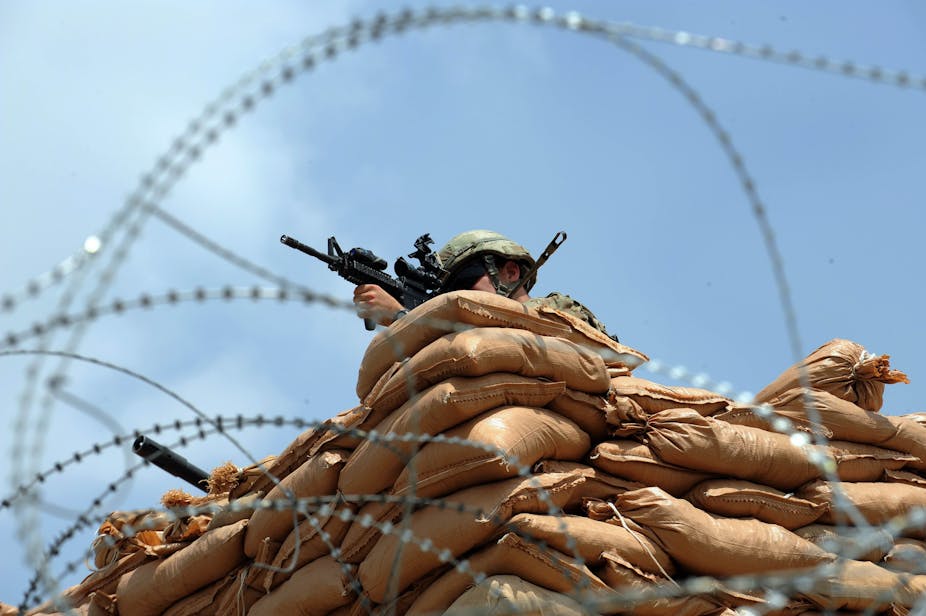On Wednesday, absent the flight suit, President Obama gave his own version of George W. Bush’s “mission accomplished” speech.
His temporary escalation of 33,000 troops in Afghanistan had worked. A third of them would come home this year and the remainder next. As these men stood down, the Afghan army would stand up.
The killing of Osama bin Laden in May had removed the symbolic value of the war and fulfilled its original counterterrorism imperative. Americans could then begin to spend the $3.4 million per hour this surge cost on “nation-building at home”. (Close to 70,000 troops, it should be noted, will remain in theatre – their permanence under review.)
But, as in Iraq in 2003, it was premature of the president to claim that “We are starting this drawdown from a position of strength.”
Obama’s plan meets a certain realist test. He was always unsure that his Afghan surge would work – he had openly queried Bush’s Iraqi version – and spent several months in 2009 deliberating before hedging on a troop number that was too little for his military commanders and too many for his political allies.
The announcement Wednesday again reflected that one-toe-in approach. General David Petraeus said the drawdown was too much too soon, Vice President Joe Biden the opposite.
So in purely political terms he has covered himself. His Republican challengers in 2012 are making noises about bringing America home from the world. The drawdown will help neutralise that populist message.
His Democratic base, similarly, are demanding he make good on his un-Bush credentials and end the Texan’s wars. He can now plausibly argue he is doing that.
However, while the politics of all this stack up, the de-escalation can be questioned on both a strategic and moral level. The wider strategy of the US will, of course, be compromised if the Taliban reform and restart their sponsorship of international terrorism.
This seems unlikely, at least in the short term, given that their first order of business will be defeating the Afghan army that America leaves behind – its total abandonment seems improbable but America did just that to the Army of South Vietnam in 1975, an observation to which I will return.
Potentially far more problematic is what the withdrawal will mean for the wider region, particularly Pakistan. Obama can afford to leave Afghanistan broken – it was Bush’s war and, according to Bob Woodward, Obama has always been “psychologically” out it – he cannot afford to do this in Pakistan, a nuclear weapons state.
So far, Obama has relied on covert intelligence gathering – with the stunning success of the bin Laden killing as proof of its effectiveness – and the use of Predator drones.
The Chicagoan community organiser has used more unmanned drones to kill more terrorists in his two years in office than the Texan cowboy did in his eight. This tactic can police the Pakistan problem; it cannot solve it.
The doomsday scenario of a Pakistani nuclear bomb falling into the hands of a terrorist can only be ameliorated by shifting the calculus of the political/military leaders away from countenancing such proliferation. Some $20.7 billion in US aid to the country since 2002 has attempted to do this. It might be that the explicit threat of military force is a necessary and ancillary component.
America can still maintain this threat with 33,000 fewer troops in Afghanistan. But with each subsequent drawdown the commitment looks weaker, the resolve more faltering.
This is where the moral consequences of Obama’s plan presents themselves. No analogy is perfect but consider America’s “occupation” of South Korea. Today, nearly sixty years since the fighting stopped, some 28,000 US troops still help police the border between the two Koreas.
That commitment nurtured a state in the South that is a veritable paradise compared to its northern neighbour. The application of American military and economic power – over decades – produced this result. A similar argument could be made about Europe after 1945.
In contrast, observe the fate of South Vietnam after 1975. Reduced to penury and communism not by the US military but by its retreat. This is not to deny that the American military failure in Vietnam did not precipitate that withdrawal. It is to argue that that withdrawal had huge political, economic and human costs for the people left behind.
Afghans who have invested in America’s presence, who have built the schools and staffed the hospitals, worn the uniforms and queued at the polling stations, must hope it is the Korean model that inspires what Obama (and his successors) do next.

